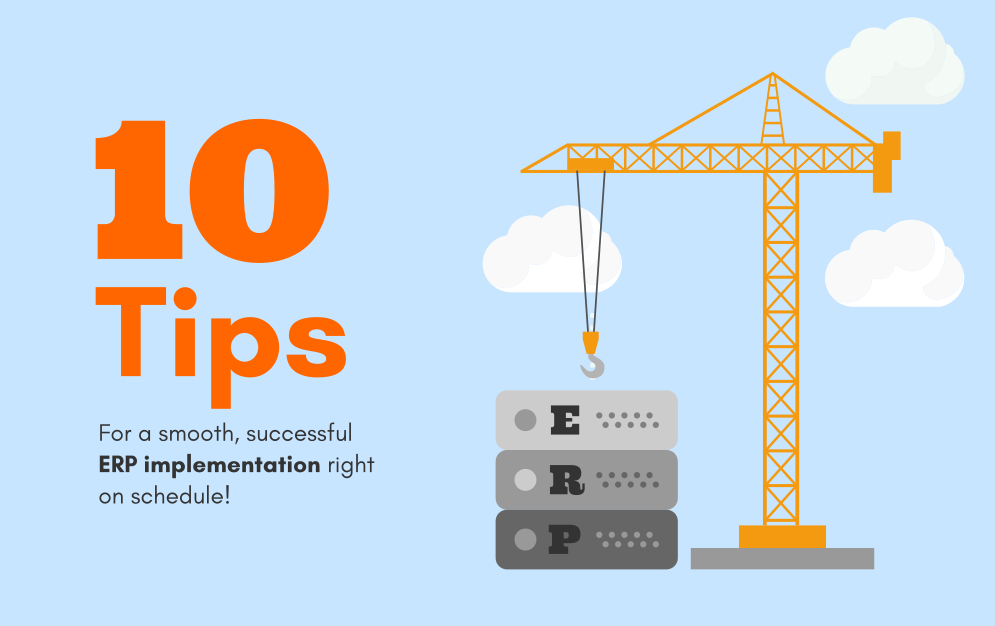If you’re engaging the services of an ERP reseller to assist you with an implementation for your business, you know how important it is to select the right ERP implementation partner for the job.
But that’s just half of the equation for a successful implementation. You also need buy-in from both the executive and the end-user levels in your business; in fact, these are also Critical Success Factors (CSFs) that determine whether an ERP implementation project is destined to succeed.
That’s why it's critical your project leader and key management be on the same page about the level of involvement they are going to invest in the implementation project, and what sort of results they can reasonably expect once the ERP system goes live.
Here are a few tips to keep in mind when you’re working with an ERP vendor to complete an implementation project for your business.
They’re Not Just Your ERP Software Vendor, But Also Your Strategic Business Partner

A strategic-minded ERP implementer will typically want to know what your business goals are, apart from your immediate requirements.
So you should expect to be asked a lot of questions about your business.
For example, suppose your company’s strategy is to pursue growth through large volume sales of low-cost, standardised products. Your end-to-end processes need to be highly repeatable, measurable, and fast in order to keep your costs low and manageable.
But your current operations rely on systems and processes that aren’t integrated with each other. This is further exacerbated by your large volume of transactions, resulting in a lot of inconsistent and inaccurate data floating between various departments.
And without a single source of truth to go to, your employees will spend significant labour and time manually reconciling the differences in information. Your management team will also find it difficult to trust the data for their decision-making, leading to slower crisis or opportunity responsiveness.
In order to support your growth strategy, you may need a systemic review and overhaul of your processes.
Strategic-minded ERP vendors will be able to assist you in this change process. They may work closely with you to identify process bottlenecks, propose new workflows to cut inefficiencies, or come up with creative ideas to gather and present data (whether in dashboards or reports).
From there, they will advise you on the best ERP system-fit based on your goals, and other factors such as:
- Risk appetite v.s. requirements. For some businesses, this plays an important factor in determining how to host their ERP system i.e. on-premise, true cloud, or private cloud
- Depth of integration needed with other ISV solutions i.e. Point-of-Sales, e-Commerce etc.
- Extent of customisation, infrastructure etc. needed to achieve your goals and requirements
What they will not do is to immediately 'push’ a software to you as a quick fix.
Any vendor that does so, or insists their one product will work wonders for your company, should be managed with caution.
Leaving the Entire ERP Project to Your ERP Partner Alone Is Unlikely To Result in a Successful Implementation
Here’s a not-so-secret truth in this industry: most ERP projects fail because of one of two factors:
One, the ERP software implementer failed to deliver what they promised.
Two, the customer failed to deliver what they promised.
Because ERP system are designed to integrate processes across multiple departments and entities in a single system, implementing one requires substantial change management commitment from the customer’s side.
A successful implementation therefore requires both customer and the ERP system reseller to work closely together.

(Christophe Megel, Executive Director at Q Industries speaking at a recent Microsoft Webinar)
Recently, one of our fastest and most seamless implementation projects was made possible because our customer’s Executive Director had clear expectations of his team’s involvement:
I knew exactly what can and cannot be done, and how it should and should not be done. I was the senior leader ensuring my people do things right, and had my finance and operations involved and championing our project in every exchange we have with AFON.
- Executive Director, Q Industries, AFON customer for Microsoft Dynamics 365 Business Central
Thanks to his commitment to see the project through, his project team was able to communicate and collaborate effectively with our consultants, leading to a swift and successful ERP deployment.
As you can see from the above, a good ERP partner will do their part to help you implement a solution on schedule and within budget.
But their effort alone is not enough to see it through, and your project team needs to be ready for certain tasks and responsibilities on their end. Your key designated project manager also needs to ensure that there is buy-in from every department in your business, and a reasonable timeline for the implementation.
Without either of these, any ERP implementation effort may run the risk of delays and / or failure to launch as per expectations.
You May Be Told “No” On Occasion By Your ERP Reseller

There's a oft-quoted catchphrase that the customer is always right.
But great ERP consultants aren't 'yes-men'; their job is to ensure you get the best value and results out of your software investment.
And sometimes this means telling you no to what you want.
Every ERP system comes with its own built-in best practices and workflows. Your ERP partner will know best which is more suitable for certain industries and business processes.
Let's use a very simplified example. Suppose your company has many offices across multiple locations around the world. Inter-company consolidation and inter-company elimination requirements will be essential for efficient day-to-day running.
Your decision maker has already set her mind on X brand software. Unfortunately, this software requires a fair amount of workaround customisations to achieve the above requirements.
Depending on the complexity of the entire project, your ERP partner may choose to minimise the amount of customisations made. Too many customisations can affect your system's ability to scale and upgrade smoothly in the future.
In such a situation, the ERP implementer may propose an alternative ERP system altogether. For example, Oracle’s NetSuite ERP comes already with its own built-in consolidation and intercompany elimination capabilities. It's also a true Cloud ERP system, which makes deployment across countries and entities faster than a standard on-premise roll-out.
So if you do meet an ERP vendor who readily claims his ERP system is the perfect fit for your business, that may be a sign they're more focused on pushing their product instead of understanding your operational requirements.
Your ERP System Partner Will Continue Working With You After The Implementation

It's important to build up a great working relationship with your chosen ERP software implementer, because your business relationship doesn’t end when your new ERP solution goes live.
There's the initial transition learning period, where your employees will need some time to adapt to the new system and processes. This can take several months, or even over a year depending on your users' level of technological know-how.
You'll find your users calling your ERP vendor's helpdesk for support and advice quite frequently at the start.
New employees who join the company after the implementation is done may also require training by your vendor.
In addition to employee training, your ERP partner will keep an eye out for any opportunities, promotions, and upgrades to optimise your business processes, such as an update in industry best practices or the emergence of new technology.
The Success Of Your ERP Implementation Depends On The Strength Of Your Partnership

Choosing the right ERP vendor is only half the battle; the other half depends on how effective your business can be as a partner to them in the implementation process.
To ensure a strong partnership between your business and your ERP vendor, the latter must be apprised of your business goals and strategy, so they can better determine what you need from your ERP system.
You must also achieve buy-in at every level in your business from executive management to end-users, and your project team must be ready to meet key milestones to assist your ERP partner with the implementation.
You will also need to be open to constructive feedback from your ERP partner, and take on board any recommendations they have on the suitability of an ERP software for your business, or any operational processes in your business that can be carried out more efficiently.
Last but not least, take full advantage of the after-live support that your ERP partner offers such as training sessions for end-users and implementation of new features.
This will make the transition to the new system much smoother, and the new ERP system will serve you well for the foreseeable future.




